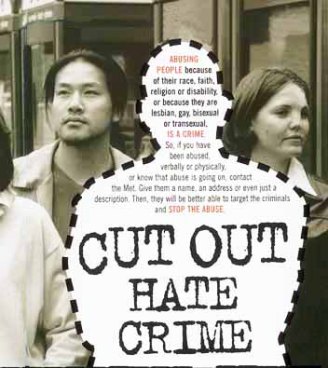By Anita Stewart for Challenging the Rhetoric and Wise Women Media
What happened in Chapel Hill, NC last week with the horrific murder of three young Islamic people was a perfect example of a hate crime, even though there is some argument now as to whether the three murders could or should be termed that way.
Ibrahim Hooper, communications director at the Council on American-Islamic Relations said referring to the attack in January against a magazine in Paris,
“We’re really seeing a spike in anti-Muslim hate rhetoric since the Charlie Hebdo attack. Personally, I’ve gotten dozens and dozens of hate emails and calls and even threats that have been turned over to the FBI, and we see this being replicated all over the country.”
What Is A Hate Crime?
The dictionary says a hate crime is “a crime motivated by racial, sexual, or other prejudice, typically one involving violence.” The hate crimes can be bullying, making threats, property damage, verbal abuse, graffiti, slander, libel, stalking, rape, physical abuse or murder.
What Are “Hate Crime” Laws or “Hate Speech” Laws?
A hate crime law is legislation intended to stop bias-motivated violence. Hate crime laws are seperate from laws against hate speech. Hate crime laws work with other laws that already govern other criminal conduct with associated penalties. Hate speech laws criminalize a type of speech that is damaging and/or threatening.
Forty-five states and Washington, DC have statutes criminalizing various types of hate crimes. Thirty-one states and the Washington DC have statutes creating a civil cause of action in addition to the criminal penalty for similar acts. Twenty-seven states and the Washington DC have statutes requiring the state to collect hate crime statistics.
Hate crime laws usually fall into one of these categories:
- laws that define specific bias-motivated acts as crimes
- criminal penalty-enhancement laws
- laws that create a distinct civil cause of action for hate crimes
- laws that require administrative agencies to tally hate crime statistics with the prohibition against discriminatory action limited to public officials.
Does Race Play A Part?
In 2010, almost half of the hate crimes reported to the Federal Bureau of Investigations (FBI) were based on race and 70% of those were determined to be committed with an anti-black bias. Other hate crimes reported were anti-white, anti-Islamic, or anti-gay for example.
Matthew Shepherd and James Byrd, Jr.
The murders of Matthew Shepard and James Byrd, Jr Hate Crimes Prevention Act also known as the Matthew Shepard Act was passed on October 22, 2009. This law expanded the US Federal Hate Crime Law to include crimes motivated by gender or gender identity, sexual orientation or disability. This bill further defined the current laws and added some requirements, such as: providing monies for local and state agencies to carry out investigations and to prosecute hate crimes and the requiring the FBI to tally statistics.
A hate crime has no place in the United States where we are all supposed to be protected by the Constitution as Americans who are honored and celebrated because of our very diversity.


No comments:
Post a Comment